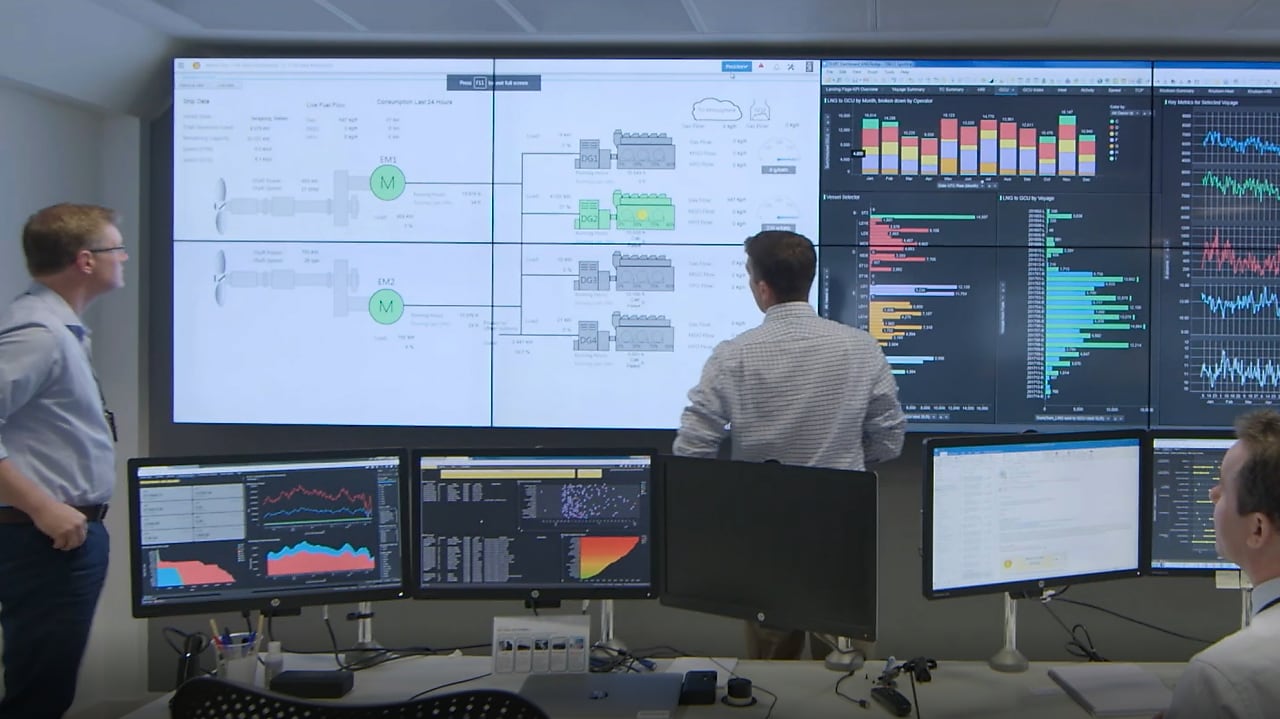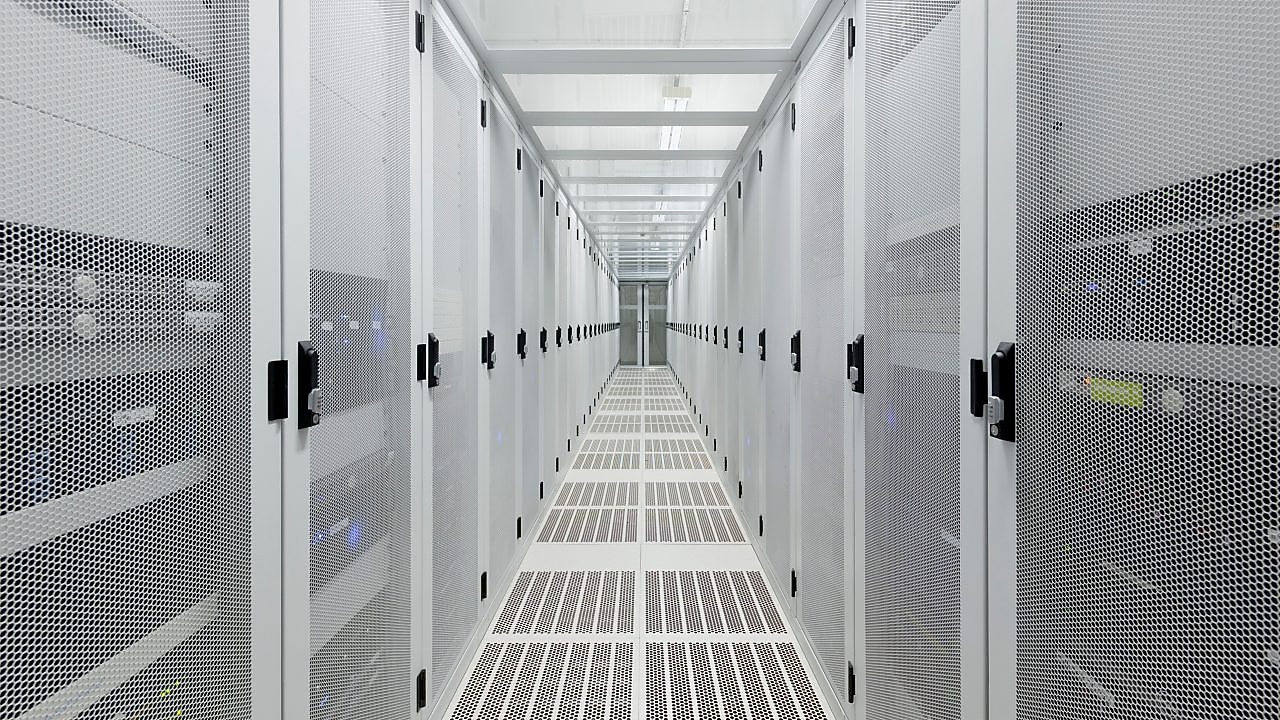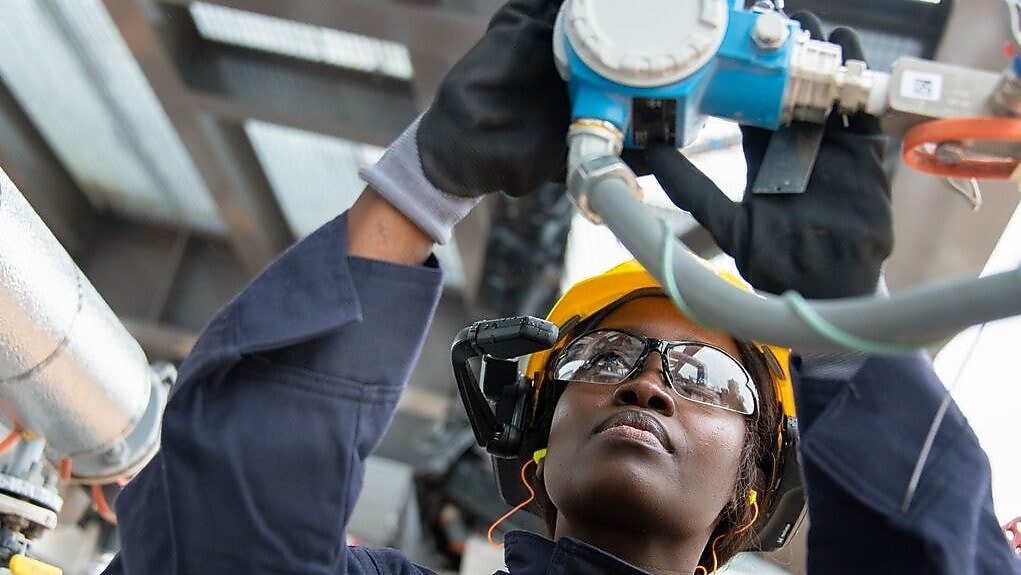
Digital Transformation in the Energy Industry
Digitalisation is transforming the energy sector by improving efficiency, safety as well as enabling the offering of low-carbon energy solutions to customers.
Explore
Digitalisation and the energy transition are two fundamental transformations that are changing the world and the energy industry

Faster energy innovation with digital and AI
From batteries to carbon capture to lower-carbon fuels, digital technologies are helping scientists accelerate the development of new materials for the energy transition.

Shell Works with NVIDIA to Advance Energy with AI
For more than a decade, Shell has been driving innovation with NVIDIA—using tech to accelerate engineering, advance safety and create better energy modeling. Here’s a look at Shell’s latest work with NVIDIA, pioneering the future of energy through technology.
Click to read more
Click to read more
16 December 2024
Into the deep: better, faster modeling
Shell has previously worked with NVIDIA to improve modeling technology; specifically, honing insights into large-scale reservoir behavior for energy resources. With traditional rock and fluid experiments in the lab taking many months, Shell’s digital rock and computational sciences team built an end-to-end pipeline of applications leveraging the NVIDIA accelerated computing platform —from taking micro-CT scans of drilling core samples to doing 3D-image reconstruction and segmentation to running flow simulations on faithful digital models of rock samples. By collaborating with NVIDIA, Shell was able to reduce the time from reconstruction to segmentation to flow simulation by 40% and predict the petrophysical properties of rocks more accurately.
Carbon sequestration, an enabler to reach a net-zero future, is another area where Shell has collaborated with NVIDIA. One facet of carbon sequestration technology is carbon capture and storage, or CCS, where carbon dioxide is injected into geologic pore space underground. Leveraging the NVIDIA Modulus framework, part of the NVIDIA AI Enterprise software platform, along with a novel Fourier Neural Operator (FNO), Shell created AI machine learning models to study carbon dioxide storage in subsurface reservoirs that are approximately 100,000 times faster than conventional physics-based simulation allows. Shell can thus screen and map potential geologic storage sites faster to swiftly evaluate different geologies, injection rates and pressures. While computational modeling is only one facet of CCS site assessment, the execution speed of these AI surrogate models supports better decision-making and scenario analysis accounting for subsurface uncertainties in a computationally efficient comprehensive probabilistic framework, as detailed in a recent NVIDIA technical blog post.
Pioneering visual remote sensing
Visual Remote Sensing (VERS) is an AI program used in Shell, leveraging deep learning and computer vision for remote sensing data with use in areas such as the energy transition, nature-based solutions and e-Mobility. Its goal is to provide businesses across Shell with the capability to remotely extract insights from a specified region of interest using AI. For example, VERS’ offspring project, BioVERS, has successfully detected many unregistered sources of renewable natural gas across regions of interest.
While VERS has demonstrated its potential, there are a number of challenges when using remote sensing data. Remote sensing data is large, sometimes terabytes in size, as well as extremely redundant. This poses challenges for training and inferencing models. Within the remote sensing program, Shell’s AI team has leveraged NVIDIA-powered compute infrastructure to develop AI models that scale across large geographical areas of interest. VERS is designed to autonomously detect targets across a range of different domains with models running on NVIDIA Triton Inference Server, part of NVIDIA AI Enterprise, for batched, multi-model inference.
By leveraging NVIDIA’s full-stack accelerated computing platform to accelerate AI model training and inference, Shell may potentially achieve better business outcomes from VERS. The ability to remotely scan and identify target classes over large geographical areas, in some cases the size of a continent, can potentially reduce time and cost associated with individuals manually doing analysis. Having accurate remote sensing models to identify target classes may possibly deliver insights that are accessible faster and may support Shell in making better investment decisions.
Machine vision: making safety visible
Machine vision is a critical aspect of Shell’s operations, from emissions detections to equipment status recognition. Shell has deployed several machine vision solutions across Shell assets. Leveraging the NVIDIA Metropolis vision AI platform, Shell can monitor equipment states at well sites, detect valve positions, read gauges, and more. Additionally, Shell can detect unsafe behaviors or mechanical errors to help prevent dangerous incidents from happening, as well as detect emissions to reduce carbon footprint.
In order for the solutions to function, training numerous machine vision models with extensive data is pivotal. Shell has leveraged NVIDIA’s accelerated computing platform not only during training, but also in the deployment phase for running models at scale across multiple computational nodes.
Beyond cloud-based applications for machine vision, real-time responses are critical for timely response and to help ensure workplace safety. When internet connectivity is unreliable, edge solutions become preferable. The NVIDIA Jetson Orin platform for edge AI and robotics serves as a powerful on-board computer designed for deep learning. Shell has deployed multiple deep learning models running in parallel on Jetson Orin system-on-modules, and is improving worker safety with vision AI solutions that help ensure technicians and engineers are wearing the correct personal protective equipment (PPE) to safeguard against workplace hazards.
Accelerating energy research with AI
Shell has a large amount of historical research accumulated over many decades that is stored in reports and internal documents. Shell has worked with NVIDIA to use generative AI and large language models on domain-specific and proprietary unstructured text and image data to make this data more easily and comprehensively accessible. Shell is experimenting with custom large language models, including using the NVIDIA NeMo platform, also part of NVIDIA AI Enterprise, for developing custom generative AI and advanced retrieval-augmented generation (RAG) techniques. Developing Shell-customized generative AI models may accelerate R&D cycle times substantially. Literature search, cross-referencing, and report reading and understanding may be much faster, allowing for smarter experimental designs from the outset of a project.
Learn more about Shell’s work with NVIDIA in this on-demand session recorded in March 2024 with Detlef Hohl, Chief Scientist Computation and Data Science at Shell.
The Digital Transformation of Shell
Read the transcript
Read the transcript
Title: The Digital Transformation of Shell
Duration : {15:11} minutes
{Opening and introductions}
Helen Forde
I do remember my first time stepping on a refinery going, wow, this is huge.
Dan Jeavons
The dimensions of it are just mind blowing.
Helen Forde
It has thousands of miles of pipeline.
Sander Buhling
Up to 10,000 valves and a million instruments.
Dan Jeavons
All of those things have sensors embedded in them. These vast data stores create a huge opportunity for digital transformation.
Ulrika Wising
And that can really lead to some significant new solutions.
Dan Jeavons
Digital transformation is really about two things. It's about recognizing that the amount of data we have around our existing business gives us a big opportunity to transform the way in which we operate. And digital transformation is also about finding ways in which we can operate in the world that's coming.
Dan Brennan
Companies in the energy industry today are going through a massive transition. If these companies can't manage the energy transition, which is really about the world demanding more energy, but more energy from sustainable sources, they're gonna have challenges operating both from a social license to operate, but also from just the basic economics of doing business.
Dan Jeavons
Shell has a really rich history in digital technologies and data science in particular. We developed a statistics group in the 1970s. And so when I started working in this space in 2013, I was building on a history that we already had. We saw that things were changing. And in particular, what was changing was the ability to take large datasets, to store them in a cloud based environment, and to use cloud based computation to accelerate the development of new software.
Alisa Choong
In 2015, I was really blessed to be given a chance to lead the digital transformation team.
Dan Jeavons
Alisa was a phenomenal visionary. She understood where the technology was going. And she understood the transformation that that could lead to for the company.
Alisa Choong
I think I've been working with Dan for about 10 years. Yeah. When he came in, he was this young punk with his hair standing up. Even though today, he still look like a punk. Yeah. What I really treasure about Dan is his passion, his passion in using technology to solve problems.
Arnold Hes
In 2014, we had a big incident where we were lucky that no people got injured. A control valve failed.
Sander Buhling
The plug came loose from the stem, and it starts oscillating in the process. And at one point, it actually broke the body of the valve.
Arnold Hes
We had to repair the plant, it cost us three weeks of unplanned downtime.
Sander Buhling
We started thinking about how we could use the data that we have already collected to prevent future failures.
Arnold Hes
We contacted the Shell data science department, they had much more experience in this.
Dan Jeavons
What was fortuitous about the work with Pernis was that it came at a time where we'd been working in this space for quite some time in Shearwater in the UK. And what we'd been looking at was the opportunity to effectively take all of the telemetry data that we had, and to use that to train data driven machine learning models to detect anomalies that humans otherwise wouldn't detect. And so we very quickly saw the opportunity to leverage this approach in Pernis.
Arnold Hes
We have years and years of data. We started with 15 valves.
Dan Jeavons
We're looking at things like the temperature of that valve, the flow rate of that valve.
Arnold Hes
Pressures - once every minute or once every second.
Dan Jeavons
And we're using that to forecast, if you will, the normal behavior of that valve, and then understand where the behavior of that valve deviates from normal conditions. And when that happens significantly enough to generate an alert.
Arnold Hes
The challenge was how to automate it without a lot of human effort. As I said, 20,000 valves in Pernis, but we have, like 100,000 valves in Shell.
Dan Jeavons
How do you scale that, to run that globally? We needed a machine learning operation solution, we also needed a solution that would scale on the vast quantities of data that's generated from these assets. We were looking to say, well do we build this ourselves? And I think what we realized quite quickly, is we don’t want to be a software platform company. Our focus is around our understanding of the problems that our industry faces.
Alisa Choong
We spotted a company that is called C3. They were at the cutting edge of developing predictive maintenance modeling, a lot of algorithms that we saw was appropriate for us.
Tom Siebel
We were approached by Shell some years ago. And we demonstrated that we can identify device failure with very, very high levels of precision. This is being accomplished through the application of an entirely new generation of technology called predictive analytics or AI.
Adi Bhashyam
Shell was interested in what C3.ai was building, and whether it would be relevant to Shell operations. The challenges they were running into were really around scaling and deploying their software and their machine learning algorithms to the entire footprint of Shell. While the mechanics of the valve were simple, the context of the valve required that each valve had to be treated as its own independent piece of equipment. Which meant that you really needed at least one independent machine learning model per valve.
Tom Siebel
Shell has an unusually gifted team of data scientists. They are professionals, they understand the industry cold. The C3.ai platform enables the Shell data scientists using the tools they've always used before to immediately put these applications to work at full enterprise, Shell scale, which is as large an enterprise as there is in the world.
Dan Jeavons
What C3 demonstrated was that their platform was capable of managing 2 million of these models. That was what excited us because it gave us confidence that they understood the problem that we had, and that their platform was scalable enough to be able to deal with it as we put these models into production.
Adi Bhashyam
The types of these successes tend to be somewhat under the radar because they're all avoided failures. Right, so nothing happened. And that's a good thing.
Arnold Hes
We have repaired 83 valves basically, that we would not have found without the analytics. And we have millions of savings on unplanned downtime.
Dan Jeavons
We've now managed to deploy multiple applications into production at scale, in really critical areas. We've developed together mechanisms to monitor over 8,000 pieces of equipment every day.
Dan Brennan
We've been able to expand the scope from just valves. There's literally hundreds of use cases.
Alisa Choong
We also now collect quite a lot of data. We collect data using robotics.
Arnold Hes
They can monitor the position of hand valves, they can detect leaks, gas leaks, but also liquid leaks. They are really helping the operators doing their daily routines.
Alisa Choong
We then looked at how we can turn this data into patterns.
Dan Jeavons
A lot of the opportunities are in optimization.
Alisa Choong
Optimization is important. We again look at the data, we can see where is best place to put the warehouse, and how's the best way to get it up to our offshore location.
Helen Forde
There will be hydrocarbons for certain industries, so the question is how do you produce it in a way that is responsible, how do you produce it in a way that gets net zero emissions, how do you do it in a way that helps support the planet.
Dan Jeavons
We've also developed technology to optimize performance of things like liquefied natural gas trains. A recent algorithm we deployed to one of these trains in Nigeria resulted in the equivalent of taking about 28,000 vehicles off the road. It's a great example of how AI is starting to have a big impact.
Ulrika Wising
Shell does a lot to try to understand our customers. And that's where AI comes in as well, and they can use multiple sources of data to actually give a much, much more holistic picture of what our customer needs.
Dan Jeavons
When you look at the energy system, everybody has a piece of the puzzle. The original equipment manufacturer has a piece of the puzzle. Baker Hughes stepped in with their deep understanding of how the equipment operates. The operator also has a piece of the puzzle because they understand how that equipment operates in context. Of course when you talk about aggregating large volumes of data you need to do that in a cloud based environment. Microsoft stepped in there to help us to accelerate the speed of development of our solutions collectively.
Alisa Choong
We collaborate with C3, Baker Hughes, as well as Microsoft, to really look at how we can accelerate our AI journey.
Dan Brennan
Shell is a long standing customer of Baker Hughes as well. So naturally, as our relationship, Baker Hughes relationship with C3 was formed, Shell became a natural party for us to collaborate on some, some new innovations on a C3 platform.
Adi Bhashyam
We have at C3.ai a deep and committed relationship with Baker Hughes. Baker Hughes has been our partner and customer for the last several years in our bid to take our solution and our capabilities to the energy field altogether.
Dan Brennan
The open AI Energy Initiative is a really exciting partnership between four founding members: Baker Hughes, C3.ai, Shell, and Microsoft. And really what it aims to do is to start to create a set of industry standards and references around how we bring AI technology to the industry.
Adi Bhashyam
The whole point of this effort was to take the learnings and innovation that we have been doing so far with Shell and bring the entire industry along.
Dan Jeavons
If we wanted to be really successful transforming the energy industry, we had to work with a broader ecosystem of partners. What the Open AI Energy Initiative tries to do, is it tries to say let’s work together on a common digital infrastructure from which we can all benefit through fair value exchange, with a common set of open data standards underpinning it, which can accelerate the digital transformation of an asset or a site in the energy sector.
Tom Siebel
This was really driven by the visionaries at Shell that are by far the leaders in applying artificial intelligence to deliver cleaner, safer, more reliable energy with less environmental impact.
Ulrika Wising
Nobody can go at this alone. It's a societal challenge that we're faced with. And with that we need to collaborate. It takes all of us to, to drive this decarbonization agenda.
Helen Forde
I think this is an increasingly important part of how we look at digital is how we help it enable our greenhouse gas ambitions.
Tom Siebel
Let's think about what Shell is doing. These guys have set the goal to reinvent themselves as a zero net carbon footprint company by 2050. This is ambitious.
Ulrika Wising
We’ve made a commitment to net zero by 2050, we have an aim of reaching 50 million customers by 2030. Which is very ambitious, but the demand for green electricity is just growing across the globe. We couldn’t do this without digital solutions.
Dan Jeavons
If you look at, for example, electric vehicles, we can look at ways in which we charge those vehicles to make sure that we maximize the amount of renewables that are on the grid at any given time. We have the opportunity to optimize the grid behavior using AI, and to balance all of those new loads that are coming onto the grid.
Ulrika Wising
If you take the example of the home, where solar panels are generating solar electricity during the day, but we're storing them in a battery and using them when people are home at night, that's a digital solution. So you wouldn't be able to do that without the right software solutions.
Dan Jeavons
At the end of the day, energy transition is urgent, we're going to have to transform the energy system faster than we've ever thought possible. And digital is one key lever to do that.
Tom Siebel
Companies that do not digitally transform themselves with this new generation of technologies will cease to be competitive.
Dan Brennan
My hope is in ten years we have an energy industry that’s producing, certainly an abundance of clean, safe, efficient energy and is able to distribute it to parts of the world that frankly don’t have access to it today.
Alisa Choong
I am very optimistic about the future. I believe technology is there to help humans solve many problems. And Shell is here to produce energy, cleaner energy for the people and for the planet.
Shell has been a pioneer in the development and deployment of digital technologies for decades. We have over 100 AI applications in various stages of development and deployment across our businesses; a data lake with trillions of rows of data and are monitoring thousands of pieces of equipment using machine learning across our assets.
Anyone can develop a small-scale proof of concept with a machine learning model that meets a specific local requirement. But, to make an impact and maintain it at scale solutions are needed which can be deployed globally at a rapid pace. To do this we are standardising approaches and aligning on common data structures, platforms, tools, and ways of working across businesses.
Digitalisation enables process improvements, cost reductions, production increases and increased customer margins across our businesses. In Shell, digital technology is making our operations more effective and efficient.
Shell is also using digitalisation and AI to reduce the footprint of our operations. For example, we use AI to improve inventory demand planning, reduce wastage of products and raw materials, and decrease idle time of heavy machinery, and uses AR, robotics and digital twin technologies to reduce the need for travel. AI is also helping Shell offer low-carbon energy solutions to our customers, from AI solutions that reduce the fuel consumption of ships; to smart charging of electric vehicles that optimises renewable energy use on the grid; to virtual power plants that connect decentralised energy units, from solar to bio-energy to hydropower.
At Shell, we use advanced infrastructure and partner with some of the world’s best tech and cloud providers to accelerate and scale digitalisation across our businesses.

Digital technology: The backbone of a net-zero emissions future
Read this report to by MIT Technology Review and Shell to understand why digital technologies will be key to the net-zero transition, and to explore the readiness of industry sectors to decarbonise through digitalisation.
Why I help to transform the energy industry?
Read the transcript
Read the transcript
Title: Why I Do What I do
Duration: 3:18 minutes
Description:
Digital technologies and trends are transforming the way we live, work and interact. Digitalisation is also transforming the energy industry, by improving efficiency and safety, and by facilitating the use of renewable energy. But it is also a cultural change, about people and agile ways of working. At Shell, leading data scientists and IT professionals are working on the transition of our business to net-zero emissions, in step with society. Meet some of our colleagues, who help power progress each day!
India Recruitment Master (01-02-21) Transcript
[Background music plays]
Bright, uplifting instrumental music with guitar.
[Video footage]
Deepa Rani, in pink and blue running gear, jogs through a garden. Close up of her moving feet. Close up of her face in profile with greenery in the background.
Deepa Rani
Working at Shell is my dream job.
[Video footage]
Deepa's face while still jogging. An office building with the Shell logo is behind her. Cut to aerial shot of Bangalore, showing a busy multi-lane highway.
[Text displays]
Bengaluru India
[Video footage]
Close up of Rishabh in a taxi.
Rishabh Chopra
I love travelling to work every day.
[Video footage]
The taxi pulls up to a building. On the back of it are the words, 100% electric. Shot of Rishabh getting out and closing the door. Cut to Rishabh's face looking up. Cut to shot of Shell office building.
Rishabh Chopra
How many people can say that?
[Video footage]
Aarthi is walking through a garden, surrounded by greenery. Shot of Shell building through the trees.
Aarthi Thyagarajan
I could change the world working at Shell.
[Video footage]
Close up of an adult hand holding a child's hand. Pull back to show Asmi walking down a garden path with her son. Cut to closeup of Asmi and her son kneeling on the ground, playing with toy dinosaurs. Cut to Asmi and her son walking in the garden.
Asmi Rizvi Khaleeli
To be the best mum and the best Data Scientist, I need support, and Shell provides that.
[Video footage]
Bus driver's point of view showing an open road. Cut to a shot of a yellow, red and white bus. Cut to a close up of Harshil's hands as he rides the bus. Cut to his face in profile, then full face as he watches out the window. The Shell building is seen, and people shown in silhouette getting off the bus. Harshil stands next to the bus and gives a V for victory sign. Cut to a shot of people's legs walking into the building. Cut to the back of Harshil's head as he enters the building.
Harshil Patel
My journey is Shell’s journey. Digital and AI are key to delivering cleaner energy solutions as we transition to a lower carbon future.
[Video footage]
Deepa is shown jogging near a pond. Her pink top is seen reflected in the pond. A bronze sculpture of two herons is near the pond. Cut to a head shot of Deepa stopped in front of the Shell building. She checks her phone and smiles. A text conversation shows on the screen.
[Text displays]
We've found a solution to help predict valve malfunctions, enjoy your jog. Wow, that's great.
Deepa Rani
My role is to increase the adoption of Artificial Intelligence across Shell by connecting people.
[Video footage]
Head shot of Deepa talking to the camera, the Shell building in the background.
Deepa Rani
And work together to make the air cleaner for all of us.
[Video footage]
Deepa types on her phone. A text conversation displays on the screen. Deepa starts running again.
[Text displays]
Thanks.
[Video footage]
Close up of Deepa in a studio interview.
[Text displays]
Deepa Rani, Shell.ai Manager
Deepa Rani
I studied Computer Science and Engineering, but I wanted to work with future technologies.
[Video footage]
Deepa sits at a glass table in the atrium of a building, working on a laptop. Closeup of Deepa's hands typing on the laptop keyboard. Closeup of Deepa's face in profile.
Deepa Rani
It’s very dynamic in nature, the way we work here.
[Video footage]
Close up of Aarthi in a studio interview.
Aarthi Thyagarajan
I just finished graduation in chemical engineering.
[Text displays]
Aarthi Thyagarajan, Senior Researcher: Computational Science
[Video footage]
Aarthi is shown in a lab surrounded by equipment. She is wearing safety goggles. Cut to view of gardens near the Shell building. Aarthi is sitting on a bench under a pergola.
Aarthi Thyagarajan
But what really motivated me is the cleaner energy concept.
[Video footage]
Closeup of Aarthi using her phone. A text conversation shows on the screen.
[Text displays]
We've got the results back from the last model simulation. It's better than we expected. Super, excited about further improvements.
Aarthi Thyagarajan
I joined Shell in 2007 and from then I never looked back.
[Video footage]
Closeup of Rishabh in a studio interview.
[Text displays]
Rishabh Chopra, Artificial Intelligence Technical Analyst
Rishabh Chopra
I wanted to enhance my skills to make a positive change.
[Video footage]
Closeup of Rishabh working on a laptop. Pull back to show that he is working in a break room. A messenger conversation shows on the screen.
[Text displays]
How's your prep going for the hackathon next week? It's going great, looking forward to it.
Rishabh Chopra
The work I do here has an impact around the world.
[Video footage]
Close up of Asmi and her son squatting in the grass. Asmi points out something to her son, who excitedly looks.
Asmi Rizvi Khaleeli
Look over there!
[Video footage]
Close up of Asmi in a studio interview.
[Text displays]
Asmi Rizvi Khaleeli, Data Science Researcher
Asmi Rizvi Khaleeli
After spending several years studying and working in some leading universities and companies in Europe I realised that there are equally good opportunities in India, and decided to come back.
[Video footage]
Asmi sitting on steps in a garden using her phone. A text conversation shows on the screen.
[Text displays]
Got the data from the plant through, ready to begin building the model? Smile emoji. Absolutely.
[Video footage]
Closeup of Asmi kneeling down, playing with her son. Closeup of Asmi's face, smiling as she plays. Close up of her son's face, looking up.
Asmi Rizvi Khaleeli
Flexible working at Shell has given me the opportunity to give my family the time they deserve, and still achieve at work.
[Video footage]
Close up of Asmi and her son in the garden. The son lifts his arms to be carried.
Asmi's son
Carry me! Carry me!
[Video footage]
The Shell building is seen through the trees. Cut to closeup of Harshil in a studio interview.
[Text displays]
Harshil Patel, Data Science Researcher
Harshil Patel
I’m a numbers and computers guy. I wanted to work for Shell to combine my knowledge of computer science and mechanical engineering.
[Video footage]
Harshil is seen working on a computer. Closeup of his hands on the keyboard. Close up of a computer screen showing data. Cut to a shot of Harshil sitting at his computer. Close up of his face, he stretches and smiles.
Harshil Patel
I get to use my coding skills to do something meaningful. I’m now writing code to help businesses reduce their carbon emissions.
[Video footage]
Deepa is walking up the stairs in the Shell building. The lobby of the building can be seen in the background. Closeup of Deepa in a studio interview. Cut to a computer screen showing some code. Cut to a shot of red and yellow hexagonal tiles showing work goals. Pull back to show many of these hexagonal tiles surrounding a whiteboard. Deepa is looking at the whiteboard.
Deepa Rani
Digitalisation is two parts of an equation. One is technology another one is people. So that is what excites me.
[Video footage]
Closeup of Rishabh's hand placing his access card on a turnstile. Shot of Rishabh walking through a corridor in the Shell building. A mural of many hands coming together is visible in the background. Cut to Rishabh working at his laptop.
Rishabh Chopra
I’ve got all the tools and the best people right here, so my work is always diverse. I’m constantly exploring new ideas and there’s never a dull moment!
[Video footage]
Long shot of Aarthi with colleagues in a laboratory. Closeup of Aarthi's face wearing a face shield. Cut to Aarthi talking with colleagues, all dressed in lab gear including red lab coats, face shields and gloves. Closeup of a small container being placed into a piece of lab equipment.
Aarthi Thyagarajan
Shell’s a global company. In the research projects I’m working on, I get to collaborate with experts and employees not only on campus, but also internationally.
[Video footage]
Shot of Harshil playing table tennis. The Shell logo on the side of the building can be seen through the window. Blurry shot of the blue table and orange ball. Closeup of Harshil's face as he plays. He bounces the ball several times on his paddle.
Harshil Patel
Shell challenges you - what you know every day, keeping you on your toes.
[Video footage]
Closeup of Aarthi's face wearing a face shield. Closeup of her hands on the laptop keyboard. Shot of her face as she works at the laptop, still with the face shield. Shot of the laptop screen displaying data. Cut to Aarthi speaking to the camera, in her lab coat and wearing goggles.
Aarthi Thyagarajan
I love working with top talent and having the freedom to explore cutting edge innovations. The Digital Technology is helping Shell in playing its part in addressing the climate change and this is at the forefront of the energy transition.
[Audio]
Shell jingle.
[Graphic]
Shell logo.
[Text displays]
Shell.ai
Discover more, Shell.com/digitalization.
© Shell International Limited 2021
What is digitalisation?
What is digitalisation?
Digitalisation is defined as the use of digital technologies to create more value in core businesses, to change a business model and to provide new value producing opportunities while building the appropriate organisational capability and mindset.
Although digitalisation is not new, the technology has become cheaper and faster and the amount of data and connectivity is increasing exponentially, which makes the application of digital technologies ready to deliver at an affordable cost.
Digital technologies and trends are transforming the way we live, work and interact. For Shell, they will help us reduce our carbon footprint, drive cost efficiency, provide new revenue opportunities, change business models and redefine our industry.
Shell is a pioneer in the development and deployment of many digital technologies. Today, we use advanced information technology (IT) infrastructure and partner with some of the world’s leading tech developers, and leverage technologies like artificial intelligence, robotics, the internet of things and blockchain in innovative ways.
What is the role of digitalisation in the energy transition?
What is the role of digitalisation in the energy transition?
Digitalisation and the energy transition are two fundamental transformations that are changing the world and the energy sector.
Both are expected to have a profound impact on the way everyone lives their lives. Global energy systems will change substantially. Digital technologies will play a key role as the world transitions to a lower-carbon future. At Shell, these technologies are helping to optimise the energy efficiency of our operations, as well as those of our customers, which helps lower the associated carbon emissions.
Digital technologies allow a more effective monitoring of greenhouse gas emissions sources and of natural and mechanical carbon sinks. Digitalisation makes it possible to design and operate entirely new low-carbon footprint energy and chemicals systems at the device, plant and regional scales.
Digital technologies are playing an important role in minimising the carbon footprint of Shell’s current operations; facilitating the decarbonisation of other sectors; and enabling the next generation of clean energy technology.
How can digital technology transform the energy industry?
How can digital technology transform the energy industry?
Digital technologies are transforming our lives in ways that were unimaginable even a decade ago. This digital transformation of the energy industry is improving efficiency and safety, and it is facilitating the increased use of renewable energy.
We are at a tipping point of exponential technological advancement. In the coming years, the internet of things will consist of a trillion sensors, all generating and sharing data. Machine learning and artificial intelligence are no longer science fiction; they are already automating and optimising operations. Digital technologies are driving cost efficiency, providing new revenue opportunities and changing business models. They have the potential to redefine the energy industry.
But the digital transformation is about more than technology. It is also a cultural change, about people and agile ways of working. We employ leading data scientists who unlock value from the data Shell has access to. They work in teams with other experts across our businesses to combine commercial acumen with technical and data expertise. They develop practical solutions, allowing us to learn and improve all the time.
How does Shell manage cyber security risk?
How does Shell manage cyber security risk?
The importance of data has never been greater, and that is why Shell is focused on developing and deploying effective systems for cybersecurity across the organisation. Effective cybersecurity enables us to protect the efficiency and productivity of our operations and ensures that we safeguard intellectual property, meet regulatory requirements and maintain our reputation as an industry leader.
Digitalisation and the drive to extract value from data will make important contributions to the success of Shell’s Powering Progress strategy, which aims to accelerate the transition of our business to net-zero emissions. We are working to transform our information technology (IT) systems to support an evolving portfolio of businesses and investing in new technologies to enhance IT capabilities such as data analytics, artificial intelligence, machine learning and virtual reality. It is helping Shell to accelerate through the energy transition. Our increasing use of digitalisation also helps us to generate shareholder value and improve safety and transparency.
Shell operates a multi-level defence strategy that is underpinned by the Shell IT Control Framework and advanced cyber-defence capabilities. This integrated approach is intended to improve our ability to deal with the complex cyber and data privacy threats that face major organisations. At the same time, we continuously assess and enhance our capabilities to minimise the likelihood of any cyberattack being successful.
Maintaining a cybersecurity mindset throughout the organisation is the first line of defence. Robust governance processes are embedded across Shell to increase cyber awareness, monitor key cyber risks and provide risk assurance. Cyber-risk strategy and risk-management protocols are regularly reviewed with the Shell audit committee and Board of Directors. Shell employees and contract staff are subject to mandatory courses and regular awareness campaigns aimed at protecting us against cyber threats.
You can find out more about information risk management in the following sections of the Shell Annual Report:
Operational risk management at Shell click here;
Information risk management and controls at Shell click here; and
Shell Control Framework, risk assessment and response at Shell click here.
To download the entire annual report, click here.










